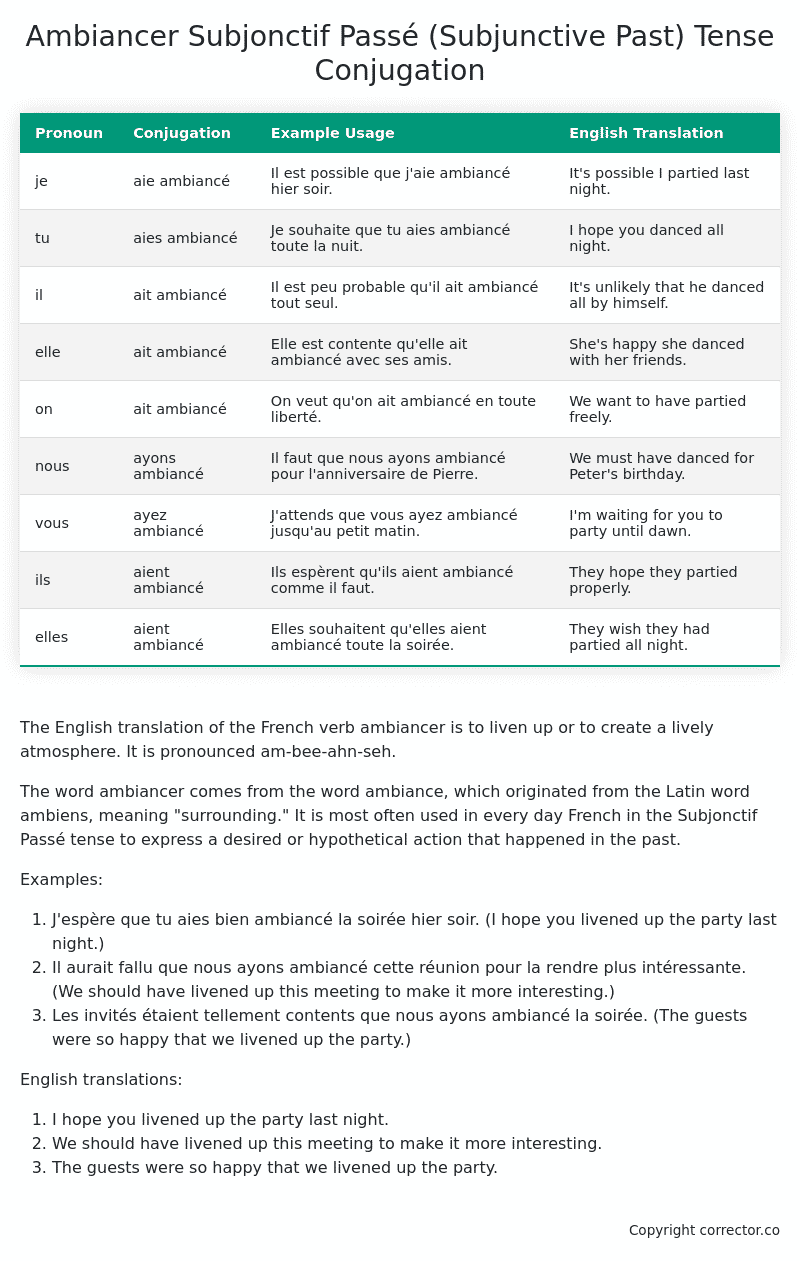Subjonctif Passé (Subjunctive Past) Tense Conjugation of the French Verb ambiancer
Introduction to the verb ambiancer
The English translation of the French verb ambiancer is to liven up or to create a lively atmosphere. It is pronounced am-bee-ahn-seh.
The word ambiancer comes from the word ambiance, which originated from the Latin word ambiens, meaning “surrounding.” It is most often used in every day French in the Subjonctif Passé tense to express a desired or hypothetical action that happened in the past.
Examples:
- J’espère que tu aies bien ambiancé la soirée hier soir. (I hope you livened up the party last night.)
- Il aurait fallu que nous ayons ambiancé cette réunion pour la rendre plus intéressante. (We should have livened up this meeting to make it more interesting.)
- Les invités étaient tellement contents que nous ayons ambiancé la soirée. (The guests were so happy that we livened up the party.)
English translations:
- I hope you livened up the party last night.
- We should have livened up this meeting to make it more interesting.
- The guests were so happy that we livened up the party.
Table of the Subjonctif Passé (Subjunctive Past) Tense Conjugation of ambiancer
| Pronoun | Conjugation | Example Usage | English Translation |
|---|---|---|---|
| je | aie ambiancé | Il est possible que j’aie ambiancé hier soir. | It’s possible I partied last night. |
| tu | aies ambiancé | Je souhaite que tu aies ambiancé toute la nuit. | I hope you danced all night. |
| il | ait ambiancé | Il est peu probable qu’il ait ambiancé tout seul. | It’s unlikely that he danced all by himself. |
| elle | ait ambiancé | Elle est contente qu’elle ait ambiancé avec ses amis. | She’s happy she danced with her friends. |
| on | ait ambiancé | On veut qu’on ait ambiancé en toute liberté. | We want to have partied freely. |
| nous | ayons ambiancé | Il faut que nous ayons ambiancé pour l’anniversaire de Pierre. | We must have danced for Peter’s birthday. |
| vous | ayez ambiancé | J’attends que vous ayez ambiancé jusqu’au petit matin. | I’m waiting for you to party until dawn. |
| ils | aient ambiancé | Ils espèrent qu’ils aient ambiancé comme il faut. | They hope they partied properly. |
| elles | aient ambiancé | Elles souhaitent qu’elles aient ambiancé toute la soirée. | They wish they had partied all night. |
Other Conjugations for Ambiancer.
Le Present (Present Tense) Conjugation of the French Verb ambiancer
Imparfait (Imperfect) Tense Conjugation of the French Verb ambiancer
Passé Simple (Simple Past) Tense Conjugation of the French Verb ambiancer
Passé Composé (Present Perfect) Tense Conjugation of the French Verb ambiancer
Futur Simple (Simple Future) Tense Conjugation of the French Verb ambiancer
Futur Proche (Near Future) Tense Conjugation of the French Verb ambiancer
Plus-que-parfait (Pluperfect) Tense Conjugation of the French Verb ambiancer
Passé Antérieur (Past Anterior) Tense Conjugation of the French Verb ambiancer
Futur Antérieur (Future Anterior) Tense Conjugation of the French Verb ambiancer
Subjonctif Présent (Subjunctive Present) Tense Conjugation of the French Verb ambiancer
Subjonctif Passé (Subjunctive Past) Tense Conjugation of the French Verb ambiancer (this article)
Subjonctif Imparfait (Subjunctive Imperfect) Tense Conjugation of the French Verb ambiancer
Subjonctif Plus-que-parfait (Subjunctive Pluperfect) Tense Conjugation of the French Verb ambiancer
Conditionnel Présent (Conditional Present) Tense Conjugation of the French Verb ambiancer
Conditionnel Passé (Conditional Past) Tense Conjugation of the French Verb ambiancer
L’impératif Présent (Imperative Present) Tense Conjugation of the French Verb ambiancer
L’infinitif Présent (Infinitive Present) Tense Conjugation of the French Verb ambiancer
Struggling with French verbs or the language in general? Why not use our free French Grammar Checker – no registration required!
Get a FREE Download Study Sheet of this Conjugation 🔥
Simply right click the image below, click “save image” and get your free reference for the ambiancer Subjonctif Passé tense conjugation!

Ambiancer – About the French Subjonctif Passé (Subjunctive Past) Tense
Formation of the Subjonctif Passé
Everyday Usage Patterns
Interactions with Other Tenses
Present tense
Future tense
Conditional
Summary
I hope you enjoyed this article on the verb ambiancer. Still in a learning mood? Check out another TOTALLY random French verb conjugation!


